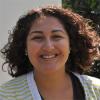Empowering women to be storytellers and writers is an act of peacemaking. Hilda Twongyeirwe, editor of I Dare to Say: African Women Share Their Stories of Hope and Survival, eloquently creates a mosaic of the struggle and dreams of Ugandan women. The collection of stories in I Dare to Say creates a community that gives power back to the victims. Knowing that real change is possible pivots individuals from victims to change agents. Stories of women getting connected to lawyers, doctors and nonprofit organizations offer hope. People around the world are aware and accompanying storytellers in their struggles: Legal aid for Nankunda Mbarara in "Quest for Freedom" and Nakato becoming a health advocate as an AIDS victim in "The Second Twin" give a sense of purpose and identity for the women.
Twongyeirwe is coordinator of FEMRITE, the Uganda Women Writers Association, which was founded in 1995 by Mary Karooro Okurut. Intentionally exclusively a Ugandan women's organization, FEMRITE empowers women living in rural areas of the country to tell their stories to fellow female Ugandan writers. I Dare to Say, alongside the 31 other books from FEMRITE, offers an escape from isolation and connection to one another as well as resources to change their situations.
The book is organized honoring four parts of women's experience in Africa: abuse, HIV/AIDS, war and genital mutilation. I am grateful for the structure of the book, including an opening from each of the authors entering into the space of the storyteller, because it offers a glimpse into the author's experience. When Rose Rwakasisi, the author of "In God's Palm," explains her arrival to the meeting place with storyteller Kyosha after getting lost and a local cyclist giving her a lift -- "I look on awkwardly, trying to keep myself from sinking in the soft ground and my black suede shoes from filling up with soil" -- she, too, is captured in Kyosha's account. This entry invites the reader into the energy of the room, creating a sanctuary for the story to be told that is sacred and dignified. The storytelling is therapy, hope for a better future and witness to the horrific accounts -- reclaiming dignity to each individual and the power of unity for women in a male-dominated society.
The thread of faith in the stories brings hope, and I feel linked in our faithfulness. When Aketch speaks about her dream college being St. Mary's College in Aboke, I see my application to Boston College, and our desires bind together. When Bibiana Kanyamihigo talks about her mother being "a zealous Catholic" whom she never knew "to miss Sunday mass in her life," I can grasp a sense of who her mother was and recognize a Catholic sister struggling in life and her faith.
As a minister on a university campus who organizes immersion experiences, I also think about the film and photographs taken on our trips. What responsibility does one have when taking photographs, beyond tourist snapshots? Am I missing an opportunity for storytelling, being a voice for the hosting community? I am inspired and believe this book is appropriately titled I Dare to Say. The editor recognizes the bravery and power lying with each author and witness. How do I honor the stories so generously offered in a tangible and empowering way?
 I DARE TO SAY: AFRICAN WOMEN SHARE THEIR STORIES OF HOPE AND SURVIVAL
I DARE TO SAY: AFRICAN WOMEN SHARE THEIR STORIES OF HOPE AND SURVIVAL
Edited by Hilda Twongyeirwe
Published by Lawrence Hill Books, $17.95
[April Gutierrez is a graduate of Boston College School the Theology and Ministry. She is currently a campus minister at Loyola Marymount University in Los Angeles.]


